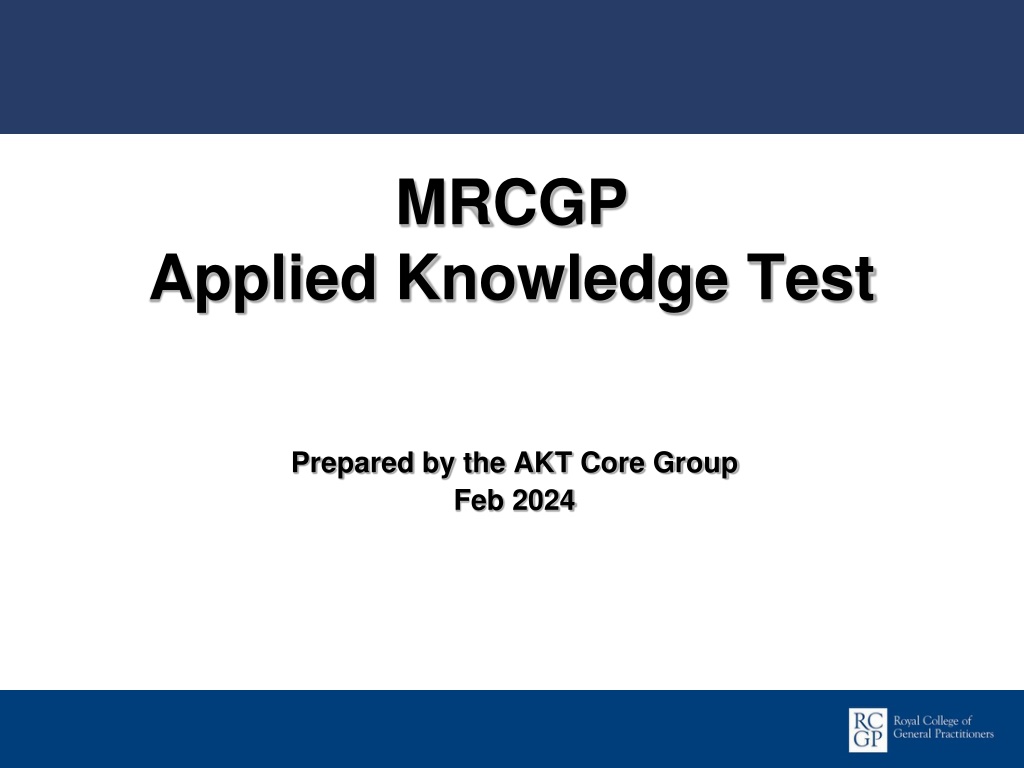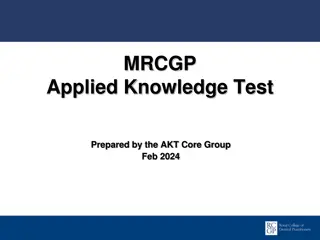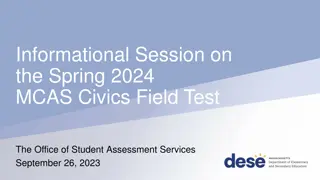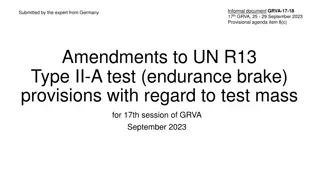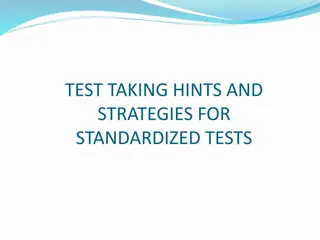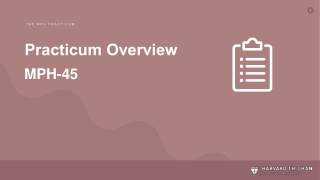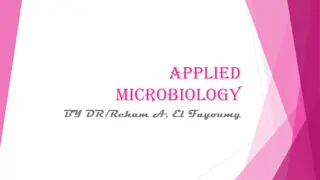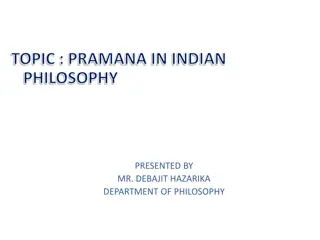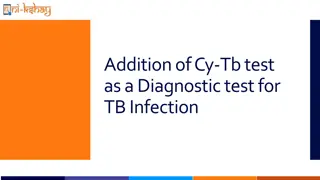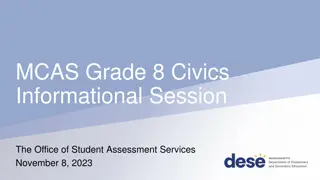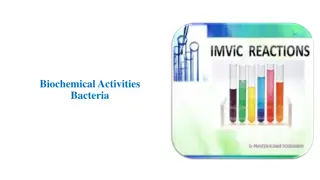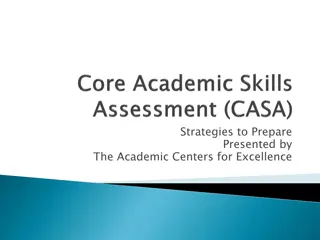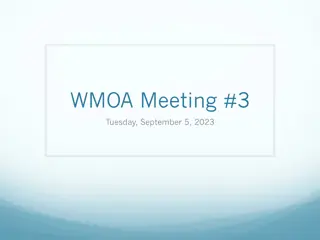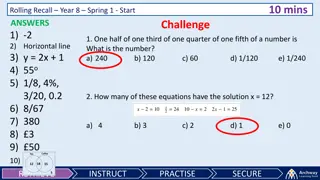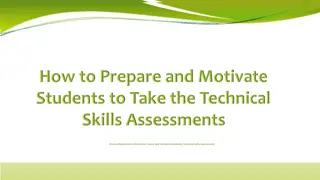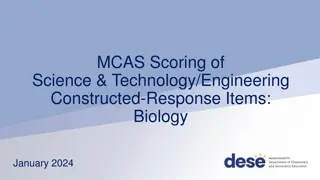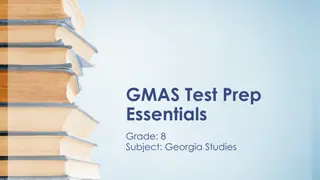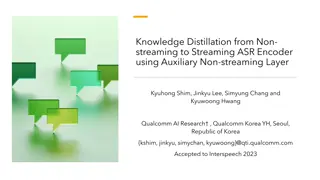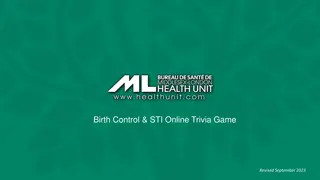MRCGP Applied Knowledge Test
The MRCGP Applied Knowledge Test (AKT) assesses the knowledge base needed for UK general practice, focusing on critical interpretation and application of information. The test comprises 200 multiple-choice questions with no negative marking, lasting 190 minutes and offered four times a year. Rules detail eligibility, currency, and attempts allowed, with exceptions for extenuating circumstances like COVID-19. Trainees at different stages have varying limits on attempts. For further information, visit the RCGP website.
Download Presentation
Please find below an Image/Link to download the presentation.
The content on the website is provided AS IS for your information and personal use only. It may not be sold, licensed, or shared on other websites without obtaining consent from the author. Download presentation by click this link. If you encounter any issues during the download, it is possible that the publisher has removed the file from their server.
Presentation Transcript
MRCGP Applied Knowledge Test Prepared by the AKT Core Group Feb 2024 Promoting Excellence in Family Medicine
Objectives An overview of the content and structure To give examples of current question formats To describe how questions are constructed To advise on how to prepare and pass the AKT To explain practicalities of computer-based tests Promoting Excellence in Family Medicine
AKT Background The AKT: Is a summative assessment of the knowledge base underpinning independent UK general practice Tests the application of this knowledge Tests the critical interpretation of information Is mapped to the latest RCGP Curriculum updates Each question is intended to explore a topic which an ordinary GP in the UK could be expected to have a working knowledge Promoting Excellence in Family Medicine
Format 200-item multiple-choice test lasting 190 minutes (3 hours 10 minutes)* No multiple true/false questions No negative marking Delivered on a computer terminal* at an invigilated test centre Offered four times a year: Jan/Feb, April/May, July, Oct/Nov * Please see slide 53 and the RCGP website for information on reasonable adjustments Promoting Excellence in Family Medicine
Rules Only trainees in the ST2 and ST3 stages of training are eligible to take the AKT. In accordance with GMC guidance* an AKT pass is valid for seven years. AiTs in training (includes TGPT, LTFT, on Maternity Leave) in ST2/3 between 18 March 2020 and 3 August 2021 whose ability to study for and take the exam was affected by COVID-19 have the currency of their AKT extended to 7 years and 6 months. * https://www.gmc-uk.org/education/postgraduate/9813.asp#Currency Promoting Excellence in Family Medicine
Rules: numbers of attempts For trainees who are already in training on 1 August 2023: Four attempts are allowed in the AKT but: due to COVID-19, a single unsuccessful attempt at either the July or August 2020 AKT did not count towards the total number of permitted attempts. trainees who have support of their deanery and additional educational attainment can apply for an exceptional fifth attempt at the AKT. They must have passed the CSA, SCA, or RCA. For trainees who enter GP Speciality training for the first time on or after 2 August 2023: A maximum of six attempts are allowed Promoting Excellence in Family Medicine https://www.rcgp.org.uk/mrcgp-exams For further information:
Vital Statistics Jan 2024 AKT 50 pass mark = 141/199 (70.9%) Overall pass rate = 68.4% UK graduates first-time takers pass rate = 87.7% (Pass rates vary in different diets of the AKT taken at different times throughout the training year) The cumulative pass rate for all those who take the AKT is stable at 95% Promoting Excellence in Family Medicine
Vital Statistics Jan 2024 Overall mean score = 148.2 (74.5%) Mean scores by subject area: Subject area Mean score (%) No. of questions Clinical knowledge 75.3 159 Evidence-based practice 72.8 20 Organisation and management 69.9 20 Promoting Excellence in Family Medicine
Topics causing most difficulty for candidates in AKT 50 Professional topics: Improving Quality, Safety and Prescribing Side-effects of long-term medications for chronic disease Pathology results: look for borderline and abnormal parameters Controlled drugs prescriptions Leadership and management: Practice administration Life stages topics: Children and Young People Faltering growth in children ( failure to thrive ) Maternity and reproductive health Investigation of gynaecological problems (and pre-referral tests) Clinical topics: ECG changes (and normal ECGs) Acute neurological presentation Promoting Excellence in Family Medicine
Topics causing most difficulty for candidates in AKT 49 Professional topics: Improving Quality, Safety and Prescribing Monitoring DMARDs Quality improvement tools and methodologies Population and planetary health Vaccinations: contraindications Life stages topics: Children and Young People Eating disorders Clinical topics: National guidance on lower and upper urinary tract infection Management of asthma exacerbations and peak flow readings Promoting Excellence in Family Medicine
Topics causing most difficulty for candidates in AKT 48 Professional topics: Improving Quality, Safety and Prescribing Prescribing antibiotics in line with national guidance Monitoring of drugs prescribed for mental health conditions Leadership and management: Death administration and involving the coroner/ procurator fiscal Application of rules on data protection and confidentiality to use of social media Clinical topics: Management of acne in line with national guidance Medically unexplained symptoms Urgent and unscheduled care and potential admission e.g. breathlessness Promoting Excellence in Family Medicine
Summary of professional topics causing most difficulty in recent AKT exams Some of these topics have been highlighted several times over recent years: Consulting in General Practice: Communication of risk and use of risk tools Evidence-based practice, Research and Sharing Knowledge: Basic understanding of concepts and terms in research (e.g. absolute and relative risk) Data interpretation (both research and other data sources) Research methodology Improving Quality, Safety and Prescribing: Antibiotic indications, guidance, and resistance Drugs: monitoring; adverse reactions; interactions; (dose calculations)*; end-of-life care Safe prescribing and medicines management (including MHRA alerts) Leadership and management: Confidentiality* and privacy (including social media and digital technologies) Death certification and notifications to Coroner/ Procurator fiscal Staff health, and health and safety in the workplace * Recently improved (AKT 45-50) Promoting Excellence in Family Medicine
Summary of other topics causing most difficulty in recent AKT exams Life stages topics: Children and Young People including consent and capacity; developmental assessment and screening; safeguarding and non-accidental injury People at the End-of-Life including ethics, pain management, and mental capacity Clinical topics: Asthma, COPD and rarer respiratory diagnoses; interpreting lung function tests Cardiovascular health including: diagnosis, ECG interpretation; reducing risk Common gynaecological problems incl. investigations, timely pregnancy testing Contraception (incl. use with teratogenic drugs) and HRT Diagnosis of common oral conditions Different presentations of multi-system disease Eye and eyelid problems Mental health presentations with physical symptoms; substance abuse Neurological diagnosis, red flags, and interpretation of examination findings Normal findings, minor illness, and infections in childhood Suspected cancer: diagnosis* & investigation (including less common presentations) Timely but appropriate referral (including emergencies and when to do nothing) Prescribing in diabetes, including insulin Promoting Excellence in Family Medicine A Five-year summary is also available on the AKT website
Question writing (1) Topical Practice issues Scenarios derived from clinical work Promoting Excellence in Family Medicine
Question writing (2) All questions are referenced and the draft questions are then carefully scrutinised by a panel of experienced question writers Care is taken to consider any conflict between national guidance and regulations across the four devolved nations Remember that all question writers are working GPs Promoting Excellence in Family Medicine
Common Reference Material (1) GMC Good Medical Practice NICE guidelines SIGN guidelines CKS (NICE clinical knowledge summaries) BMJ Review articles & original papers BJGP Cochrane Vaccine update (www.gov.uk) / Green Book The AKT does not test on local guidance Promoting Excellence in Family Medicine
Common Reference Material (2) BNF including the initial generic chapters in the print version A review has highlighted that up to 27% of AKT questions require a knowledge of therapeutics For example, although items might appear to be about a respiratory, cardiovascular or endocrine issue, the management will often involve recommending the correct medication also requiring an awareness of the potential for interactions and monitoring requirements Promoting Excellence in Family Medicine
GP Curriculum Where to find https://www.rcgp.org.uk/training-exams/training/gp-curriculum- overview.aspx Curriculum summaries (to help identify learning needs): https://www.rcgp.org.uk/mrcgp-exams/gp-curriculum/super-condensed- guides How the AKT links to the curriculum Questions in the AKT sample across the breadth of the curriculum The previous AKT Content Guide has been subsumed within the GP Curriculum and details can be found in the Knowledge and Skills subsections of each Topic Guide Promoting Excellence in Family Medicine
GP Curriculum How to use the GP Curriculum Don t be put off by the lengthy list of topics! Use the topic guides as needs assessment tools Carefully review the sections relevant to: Organisation and management including administrative, statutory, ethical and regulatory frameworks Evidence-based practice including research, statistics and epidemiology Promoting Excellence in Family Medicine
MRCGP AKT Exam website Please look carefully at our website https://www.rcgp.org.uk/mrcgp-exams The How to prepare for the AKT section contains helpful resources, including: Preparing to take the AKT pdf 50 AKT Sample questions with answers How trainers can help with AKT preparation Evidence and data interpretation in the AKT AKT FAQs Re-sitting the AKT The section AKT Feedback Reports contains specific feedback on previous exams and should help guide your revision plans Promoting Excellence in Family Medicine
Exam Construction ensures: Reliability, validity, and fairness Adequate coverage of the topics that appear in the blueprint The correct balance of question formats Promoting Excellence in Family Medicine
Principles of exam construction Relevance: the AKT should be relevant to general practice High prevalence: any topic covered can be one which occurs commonly High impact: any topic covered can be one that is significant but less common Promoting Excellence in Family Medicine
AKT content 80% of questions Core clinical medicine and its application to problem solving in a general practice context 10% of questions Data interpretation, critical appraisal, and evidence based clinical practice 10% of questions Ethical and legal issues as well as the organisational structures that support UK general practice Promoting Excellence in Family Medicine
Clinical Medicine (1) The broad topic of clinical medicine is subdivided into groups of body systems, in approximately equal numbers Each group will comprise questions on: disease factors symptoms investigation management Promoting Excellence in Family Medicine
Clinical Medicine (2) Cardiovascular Dermatology Endocrinology ENT Gastroenterology Genetics Haematology Immunology Infection Mental health & learning disability Musculo-skeletal Neurology Ophthalmology Paediatrics Renal Reproductive male/female Respiratory Therapeutic indications and adverse reactions Promoting Excellence in Family Medicine
Clinical Medicine (3) Common, (mostly) low impact e.g. sore throat, contraception, irritable bowel syndrome Rare, high impact e.g. child abuse, meningitis, phaeochromocytoma Topical e.g. guidance, COVID-19, optimum use of antibiotics Promoting Excellence in Family Medicine
Critical appraisal and evidence- based clinical practice Understanding the application of critical appraisal skills which will be tested in several formats including: interpretation of data commonly seen by GPs, including methods and results from published research understanding of common terms used in both evidence-based medicine and statistics understanding epidemiology relevant to general practice Understanding the principles of audit and its application in assessing the quality of care Promoting Excellence in Family Medicine
Critical appraisal and evidence- based clinical practice We use a range of resources to test data interpretation, including the types of graphs and tables regularly sent to practices from local health service organisations and health boards. We would encourage you to use the following AKT Group tutorial worksheet: https://www.rcgp.org.uk/getmedia/e2ba263c-385f-4e3c-9fc4- 7bd13beeca40/Evidence-and-data-interpretation-in-the-AKT.pdfThere is a new video tutorial by prof Mike Harris: How to interpret the results of a randomised controlled trial Promoting Excellence in Family Medicine
Ethical, Legal & Organisational These questions are written to be applicable UK-wide NHS organisation Legal aspects e.g. DVLA Medical certification e.g. death certificates Professional regulation, e.g. GMC Business aspects e.g. GP contract Prescribing e.g. Controlled drugs Appropriate use of resources e.g. drugs Health & Safety e.g. needlestick injury Social services e.g. safeguarding Ethical e.g. Mental capacity, consent Promoting Excellence in Family Medicine
Question Formats Single Best Answer (SBA) Multiple Best Answer (MBA) Extended Matching Questions (EMQ) Photographic image Data interpretation Free text Drug calculation Promoting Excellence in Family Medicine
Single Best Answer (SBA) According to national guidelines means recommended by nationally accepted guidelines or the BNF, not local practice Often use a clinical scenario Only one answer is correct Other incorrect options may be plausible but not most likely/most appropriate Promoting Excellence in Family Medicine
SBA example: Respiratory disease A 41-year-old man has a chronic cough and expectorates green sputum daily. He has a history of recurrent chest infections in childhood. Which is the single most likely diagnosis? Select one option only. A. Asthma B. Bronchiectasis C. Chronic obstructive pulmonary disease D. Gastro-oesophageal reflux E. Lung cancer Promoting Excellence in Family Medicine
Multiple Best Answer (MBA) Often uses a clinical scenario Two answers are correct Both answers must be chosen to score one mark Other options may be plausible but not the most likely/most appropriate Promoting Excellence in Family Medicine
MBA example: Helicobacter pylori A 35-year-old man has persistent dyspepsia. A stool test for Helicobacter pylori is positive. He has not yet received any antibiotic treatment and is allergic to penicillin. According to current national guidance, which are the two most appropriate first-line antibiotics to combine with omeprazole to eradicate H.pylori? Select two options only and both must be correct to score one mark. Promoting Excellence in Family Medicine (See next slide)
MBA example: Helicobacter pylori A. Amoxicillin B. Cefalexin C. Clarithromycin D. Co-amoxiclav E. Doxycycline F. Erythromycin G. Lymecycline H. Metronidazole Promoting Excellence in Family Medicine
Extended matching questions (EMQ) These questions have a list of possible options There will usually be two or more scenarios Choose the most likely/most appropriate option that best matches each given scenario Each option can be used once, more than once, or not at all Promoting Excellence in Family Medicine
EMQ example: Dietary advice A. Elemental diet E. High fibre B. FODMAP F. Lactose-free C. Food elimination G. Low purine D. Gluten-free H. Mediterranean For the patient described, select the most appropriate diet from the list of options. 1. A 23-year-old woman has had mild diarrhoea, abdominal pain and bloating for several years. Her bloods are normal, including IgA anti-tTG antibodies test. Promoting Excellence in Family Medicine
EMQ example: Dietary advice A. Elemental diet E. High fibre B. FODMAP F. Lactose-free C. Food elimination G. Low purine D. Gluten-free H. Mediterranean For the patient described, select the most appropriate diet from the list of options. 2. A 62-year-old man has recurrent swelling of his great toe which responds to naproxen. He drinks 18 units of alcohol a week and his urate level is 540 mol/L (Normal < 450 mol/L). Promoting Excellence in Family Medicine
Picture Format example: Skin disease A 32-year-old man has a rash affecting both elbows. He is using a topical emollient regularly. pcds.org.uk Promoting Excellence in Family Medicine
Picture Format example: Skin disease According to current guidance, in addition to emollients, which is the single most appropriate initial topical treatment? Select one option only. A. Calcipotriol + betamethasone B. Calcitriol C. Fusidic acid + hydrocortisone D. Mometasone furoate E. Tacrolimus Promoting Excellence in Family Medicine
Data Interpretation Interpretation of data, e.g for groups of patients with chronic conditions Interpretation of research and audit results Understanding and application of common statistical terms, e.g number needed to treat (NNT) and absolute or relative risk Promoting Excellence in Family Medicine
Data Interpretation example Statins The figure shows a meta-analysis of safety and efficacy outcomes for statins in the primary prevention of cardiovascular disease (CVD). BMJ 2021;374:n1537 Fig 3 Promoting Excellence in Family Medicine
Data Interpretation example Statins According to the data shown, which is the single most accurate statistical description of the effects of statins? Select one option only. A. Increased risk of diabetes B. Increased risk of muscle disorders C. Increased risk of stroke D. Reduced risk of death from CVD E. Reduced risk of liver dysfunction Promoting Excellence in Family Medicine
Free text questions Require the candidate to generate the correct answer without a list of options to choose from For example: dose calculation name of first-line medication Eliminates guessing from a list of answers All answers are screened manually to check for minor typographical errors which may be counted as correct. Candidates will be expected to spell drug names correctly Promoting Excellence in Family Medicine
Free text example A 67-year-old man has type 2 diabetes and a BMI of 33 kg/m2. His HbA1cis 62 mmol/mol on diet alone and his renal function is normal. Which is the single most appropriate initial drug treatment? Give one answer only. Promoting Excellence in Family Medicine
Free text questions - numerical An on-screen calculator is available Any arithmetic required in an AKT question (e.g. drug dose calculations) is basic and simple and most candidates do not need to use it Remember to check that your given answer is credible! Promoting Excellence in Family Medicine
Calculation example A 3-year-old boy is to start prophylactic trimethoprim 2 mg/kg once every night. He weighs 12.5 kg and trimethoprim oral suspension is available as 50 mg/ 5ml. What volume of liquid is required for thirty days use? Type your answer in the following text box. Use figures not words. Percentages and fractions are not acceptable. mls Promoting Excellence in Family Medicine
Scoring All question formats have equal weighting Each correctly answered question is awarded one mark Total score on the paper is the number of correct answers given No negative marking it is important to answer all the questions Promoting Excellence in Family Medicine
Computer Based Testing Once candidates have applied via the RCGP website to sit the AKT, they are then directed to the Pearson VUE website to make their test centre booking. There is a limited booking window with first come, first serve choice of test session and venue. There are approximately 150 test centres covering all parts of the UK. Promoting Excellence in Family Medicine
Computer Based Testing Rules Candidates must bring identity documents which match exactly their application details (see next slide) Candidates should arrive in good time Candidates who either arrive late or fail to provide matching ID, will not be admitted to sit the AKT Promoting Excellence in Family Medicine
